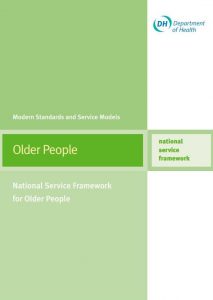“Pressures affecting hospitals and the social care system have rarely been out of the news in recent months,” observes social care, health policy consultant – and SCIE Associate - Richard Humphries. He believes now is the time to open up discussion on the benefits of intermediate care…

The number of people affected by hospital delayed transfers of care (DTOCs) has been a high-profile lightning conductor of concern, particularly in the last two years.
There are real tensions between the NHS and local government about the level of priority given to DTOCs at the expense of other pressure points, for example, the home care market – an area which also affects hospitals.
But focusing simply on getting the numbers down creates a real risk of hitting the target but missing the point – how to ensure people get the right care, in the right place, at the right time. This is why Intermediate Care – the first subject of the Social Care Institute for Excellence (SCIE) ‘Highlights’ series – is so timely and topical.
 Intermediate care services have been around for over twenty years and were a key feature of the highly acclaimed National Service Framework for Older People in 2001. They help people to avoid going into hospital or residential care unnecessarily, speed up hospital discharge and help people to be as independent as possible after a stay in hospital.
Intermediate care services have been around for over twenty years and were a key feature of the highly acclaimed National Service Framework for Older People in 2001. They help people to avoid going into hospital or residential care unnecessarily, speed up hospital discharge and help people to be as independent as possible after a stay in hospital.
Care closer to home has remained a central policy objective of successive governments; for example the prospects for Sustainability and Transformation Plans (STPs) in shifting substantial amounts of care away from hospitals and long term care. This will rest heavily on the availability of well-designed intermediate care services that are tailored to local needs and circumstances.
The evidence is positive. Intermediate care seems to work for most who receive it - over 90 per cent become more independent and most are able to return home and more able to maintain social contact. Most people like the service and it usually costs much less than an acute hospital bed.
With mounting pressures on the hospital and social care system, this ought to be an idea whose time has come. Yet in recent years investment has stalled and capacity is around a half of what is required. Reablement capacity is falling – despite increasing evidence of its effectiveness – and waiting times for intermediate care are rising – see the National Intermediate Care Audit.
SCIE’s summary explains why intermediate care needs fresh impetus and pulls together key learning points that can be used to guide the development of services. These include:
- the importance of intermediate care as an integrated feature of the care pathway rather than just a piecemeal provision that is bolted on to traditional services;
- effective system leadership;
- clarity and realism about purpose and outcomes.
 In many parts of the country intermediate care has been a positive success story of effective joint working between health and social care.
In many parts of the country intermediate care has been a positive success story of effective joint working between health and social care.
In Somerset and Trafford, for example, the engagement of independent social care providers has led to better outcomes for individuals and lower costs for the local authority and NHS.
These are win-wins that demonstrate how collaboration can trump conflict even in these tough times.
About Richard
Richard is a SCIE Associate and also Visiting Professor at the University of Worcester and Senior Fellow at The King’s Fund.
8 comments
Comment by Claire Holditch, Director, NAIC posted on
The focus on intermediate care by the SCIE and DH is very welcome. As you point out, the National Audit of Intermediate Care (NAIC) demonstrates that intermediate care works but highlights the difficulties of shifting resources to build capacity in out of hospital services, with investment stagnant in the three years to 2015. The NAIC 2017, publishing in November 2017, will reveal whether new funding and care models are starting to have an impact on capacity and outcomes in these services.
The NAIC has had great take up this year, with nearly 700 services in England, Wales and Northern Ireland involved. There is huge enthusiasm amongst participants to continue to shine a light on intermediate care services which are key to the transformation agenda, as you describe, but often poorly understood.
https://www.nhsbenchmarking.nhs.uk/projects?category=NAIC
Comment by Pamela Newman posted on
I totally agree. Sadly due to numerous mistakes in the last 17 years I have gone from a healthy but wobbly 53 year old to a 70 year old almost paraplegic. I have always believed in preventative medicine but this has gone beyond rediculous. I was told I didn't have Sjogrens Syndrome in 2000 with an ANA Homogenous 320 (that's seronegative Lupus 95% 5% NAFLD) to having Sjögren's over and over, then a Consultant Dermatologist noticed cutaneous Lupus 2010 back to being told I was a hypochondriac by the Local Rheumatologist in 2012. During that time I was seeing 3 Consultants a week all the operations failed, then an abscess in my spine 2005 was mismanaged by the local NHS hopital The Princess Royal Haywards Heath. Finally I have found out the real truth I have Ehlers -Danlos VIII and Lupus with Transverse Myelitis. The last thing I want is to sue the NHS but we are now so poor and our oil boiler has broken down. Can I get help no, I don't receive pension credits. My husband takes all my DLA to run the house. All I want is a kind charity to replace the broken boiler before the winter comes. We must all try our best not to blame the NHS it's overburdened and has been underfunded by government for decades. There has to be more care in the community, I certainly have done that. Our first son was a cot death I worked for what is now the Lulaby trust for years. Now I run a FB group to help others in need it's been a 24/7/52 unthanked job for people with Sjögren's Lupus and Ehlers-Danlos.
Comment by Mandy Cowden posted on
Intermediate care with needs to be seamlessly linked with the person's community networks ..no delays in getting the right support to return home when ready and opportunities for creative use of ADS.
Sometimes the standard set and personalised strengths based approach of rehab ends when the person returns home to be replaced with the formualic three 15 minute calls a day.
Comment by MBD posted on
Richard
Good to see focus on this vital (and cost saving) area, but:
It's great that we are conducting a Post Mortem, but I think we need proactive First Aid rather than mortuary services from Health/Social Care Leadership - leaders lead, not mop up the blood pools afterwards - that's cleaners.
Isn't it time to talk about something PRIOR to crisis, PRIOR to senior judges pillorying HMG. Perhaps my expectations of my employees (especially those in Parliament) are too high?
Comment by Lynn Evans posted on
I work in an Intermediate facility and all I can say is that it focuses purely on the individual concerned, rehabilitates where possible and maintains local community links for the person and their family. It saves the NHS and Social care money as the assessment process is tailored to the individuals care needs with the aim of them returning home with the correct support. Professionals from both health and social care work very closely to ensure a seamless move between hospital and home or prevents hospital admissions. This is the way to go. More joined up thinking and a personalised service keeping the person at the centre of the process.
Comment by Nicola posted on
I agree with Lynn's comment we need a "more joined up thinking and a personalised service ".
Too often I speak to people who have been sent on a chaotic signposting wild goose chase, resulting in disengagement or unsustainable placement. Hitting the target (discharge) and missing the point (falling back on the NHS or Local Authority) happens because we continue to divorce the need from the cost and despite new legislation, reviews and consultations that doesn't seem to be changing any time soon.
Care Fees Advice must be available at the same time as sourcing care and support services if we are to encourage sustainable long term care decisions.
Intermediate care can certainly play a part in tackling the lack of resources, staff and available care provision but the right care starts with the right advice and a more joined up personalised service is needed without introducing multiple agencies, process's and professionals into one person's life.
Qualified 'Care Navigators' act as a single point of contact to support older people, their family and carers.
Comment by Mary MacLachlan posted on
When will the British Community come to their senses. Intermediary care is essential but unless we are all prepared to pay towards it we can't have it. A few pence on tax per individual and stopping the overgenerous pay outs for those who aren't prepared to work would solve the problem. If it was coupled with a rise in pay for carers, job done. All the local hospitals that have been closed, four in my area of Devon should have been used for intermediate care, they always used to be. More joining up of the Social Care budget and that of the NHS would help, it is after all the same money and belongs to us. Pay the management everywhere a few £100,000 less and think how much more there would be for NHS 7 Social services.
Comment by Kerri Joynt posted on
I work for ICT in the community. For me the main delays and problems are as follows, 1. Criteria- does the patient fit the criteria for rehabilitation and the chances of reaching full independence following admission. Red flag areas are pre existing conditions such as dementia, parkinsons etc. These people more than likely will need long term care therefore would it be in the best interest to get social care involved early on and refer from hospital? 2.explanation of services. ICT do not give timed visits we arrive when we arrive and stay as long as needed.we do not carry out domestic duties or cooking, if this is what the patient needs help with refer to age uk or care companies. We do not automatically give every person four visits a day and we are not likely to come for 6 weeks because of hip precautions. Be realistic on what the patient can do independently because once hcsws come in majority 'expect' them to do all the work when in fact we promote independence within the own home and only support where needed for example dressing and washing and transferring items where required. 3. Fast track. Patients must be on end of life with weeks expectancy. If this is not the case refer to commissioning. 4. Lack of 'bridging' I don't know of any company that bridges the gap between a care company taking over, this needs addressing as the patient is stuck within the service preventing any more referrals in and discharges from happening. 5. Medication- can the patient manage their medication independently this needs identifying early on and aids implemented if not, could the pharmacist be more involved in the community with teaching and showing aids such as pill dispensers?5. Family support. If family take on the roll of carers is there respite available. What support can we offer families when things get too much?